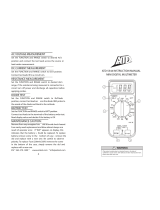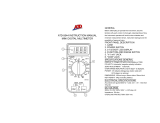Page is loading ...

5
6
2
4
3
1
P
O
A
U
O
T
O
F
F
E
R
W
OFF
A
V
R
a
n
A
u
t
o
D
M
M
i
n
g
g
8
9
7
10
DT-118B
T
O
A
U
A
E
R
W
P
O
O
F
F
OFF
V
Hz%
R
a
n
A
u
t
o
D
M
M
i
n
g
g
Instruction Manual
3in1 Pocket Autoranging DMM
PDMT05
Features
3-3/4 digit 4000 count) LCD display
Built-in non-contact AC voltage detector
plus flashlight
Double Molded housing
CATIII 1000V
200mA/500V Resettable Fused current inputs and
Overload protection on all ranges
Autoranging with auto power off
www.pyleaudio.com
Safety
International Safety Symbols
This symbol, adjacent to another symbol or
terminal, indicates the user must refer to the manual
for further information.
This symbol, adjacent to a terminal, indicates that,
under normal use, hazardous voltages may be
present.
Double insulation
Safety Precautions
1. Improper use of this meter can cause damage, shock, injury or
death. Read and understand this users manual before
operating the meter.
2. Make sure any covers or battery doors are properly closed and
secured.
3. Always disconnect the test leads from any voltage source
before replacing the battery or fuses.
4. Do not exceed the maximum rated input limits.
Input Limits
Function Maximum Input
V DC or V AC 600V DC/AC
µA AC/DC 200mA/500V fast acting
Resettable Fuse
Resistance, Diode &
Continuity Test
600V DC/AC
5. Use great care when making measurements if the voltages are
greater than 25VAC rms or 35VDC. These voltages are
considered a shock hazard.
6. Always discharge capacitors and remove power from the
device under test before performing Diode, Resistance or
Continuity tests.
7. Remove the battery from the meter if the meter is to be
stored for long periods.
Meter Description
1. Non-contact AC voltage detector probe tip
2. Non-contact AC voltage indicator light
3. 3 3/4 Digit (4000 count)
4. MODE button
5. Function switch
6. Flashlight
7. Flashlight button
8. Hz/%Duty button
9. Battery Cover
10. Test leads
Specifications
Electrical Specifications
Function Range Accuracy
400mV,
(0.5% rdg + 3d)
DC Voltage
4.000V,40.00V, 400.0V,
600V
(1.2% rdg + 3d)
4.000V, 40.00V
(1.0% rdg + 8d)
AC Voltage
50-60Hz
400.0V, 600V
(2.3% rdg + 10d)
400.0µA, 4000µA
DC Current
40.00mA, 200.0mA
(2.0% rdg + 8d)
400.0µA, 4000µA
AC Current
50-60Hz
40.00mA, 200.0mA
(2.5% rdg + 10d)
400.0 (0.8% rdg + 5d)
4.000k, 40.00k,
400.0k
(1.2% rdg + 5d)
4.000M (5.0% rdg + 5d)
Resistance
40.00M (10.0% rdg + 5d)
4.000nF
(5.0% rdg + 0.6nF)
40.00nF
(5.0% rdg + 30d)
400.0nF
(3.0% rdg + 15d)
Capacitance
4.000µF, 40.00µF,
200.0µF
(5.0% rdg + 25d)
Frequency 9.999Hz, 99.999Hz,
999.9Hz, 9.999kHz,
(2.0% rdg + 5d)
Duty Cycle 0.5-99%
(2.0% rdg + 5d)
Max input voltage 600V AC/DC
Diode Test Test current 1mA max., open circuit voltage
of 1.5V typical
Continuity Check Audible signal if the resistance is <100
Display 4000 count 3 -3/4 digit LCD
Over range indication LCD displays “OL”
Polarity Minus (-) sign for negative polarity.
Low Battery Indication “BAT” symbol indicates low battery
condition.
Input Impedance >7.5M (VDC & VAC)
AC Response Average responding
ACV Bandwidth 50Hz to 60Hz
Auto Power Off 15 minutes (approximately)
Fuse mA, µA ranges; 0.4A/600V fast acting
Resettable Fuse
Batteries
Two 1.5V AAA
Operating Temperature 32
o
F to 104
o
F (0
o
C to 40
o
C)
Storage Temperature 14
o
F to 122
o
F (-10
o
C to 50
o
C)
Weight 145g
Size 104x55x32.5mm
Standard IEC61010-1 CAT III 1000V Pollution
degree II, CE Approved

Operation
AC/DC VOLTAGE MEASUREMENTS
CAUTION: Do not measure AC/ DC voltages if a motor
on the circuit is being switched ON or OFF. Large
voltage surges may occur that can damage the meter.
1. Set the function switch to the green V position.
2. Press the MODE button to indicate “DC” or “AC” on the
display.
3. Touch the black test probe tip to the negative side of
the circuit.
Touch the red test probe tip to the positive side of the
circuit.
4. Read the voltage in the display
DC/AC CURRENT MEASUREMENTS
1. Set the function switch to the µA/mA position.
2. For current measurements up to 4000µA DC/AC, set the
function switch to the mA position
3. Press the MODE button to indicate “DC” / “AC” on the
display.
4. Remove power from the circuit under test, then open up
the circuit at the point where you wish to measure
current.
5. Touch the black test probe tip to the negative side of
the circuit.
Touch the red test probe tip to the positive side of the
circuit.
6. Apply power to the circuit.
7.
Read the current in the display
NOTE: 0.2A/500V fast acting Resettable Fuse
current inputs and Overload protection on mA, µA
ranges. No replacement required.
RESISTANCE MEASUREMENT
WARNING: To avoid electric shock, disconnect power to
the unit under test and discharge all capacitors before
taking any resistance measurements. Remove the
batteries and unplug the line cords.
1. Set the function switch to the Ω position.
2. Press the MODE button to indicate on the display.
3. Touch the test probe tips across the circuit or part under
test. It is best to disconnect one side of the part under
test so the rest of the circuit will not interfere with the
resistance reading.
4. Read the resistance in the display
CONTINUITY CHECK
WARNING: To avoid electric shock, never measure
continuity on circuits or wires that have voltage on them.
1. Set the function switch to the Ω position.
2. Press the MODE button to indicate on the display
3. Touch the test probe tips to the circuit or wire you wish to
check.
4. If the resistance is less than approximately 150, the
audible signal will sound. If the circuit is open, the
display will indicate “OL”.
DIODE TEST
1. Set the function switch to the Ω position.
2. Press the MODE button to indicate on the
display.
3.
Touch the test probes to the diode under test. Forward
voltage will typically indicate 0.400 to 0.700V. Reverse
voltage will indicate “OL”. Shorted devices will indicate
near 0V and an open device will indicate “OL” in both
polarities
Capacitance Measurement
WARNING: To avoid electric shock, disconnect power to the unit
under test and discharge all capacitors before taking any
capacitance measurements. Remove the batteries and unplug
the line cords. Never measure continuity on circuits or wires that
have voltage on them.
1. Set the function switch to the “ •))) ” position.
2. Press the SELECT button until “nF” appears in the display.
3. Press the RELATIVE button to zero the display
4. Connect the test leads to the capacitor to be measured.
5. Read the value on the display.
Frequency/Duty Cycle Measurement
1. Set the function switch to the “HZ/DUTY” position.
2. Press the Hz/DUTY button once to display Duty Cycle %. Pressing
the button again will toggle the display to frequency (Hz).
3. Touch the test probe tips to the circuit under test. Be sure to
observe the correct polarity (red lead to positive, black lead to
negative).
4. Read the value on the display.
Non-Contact AC Voltage Measurements
1. Touch the probe tip to the hot conductor or insert into the
hot side of the electrical outlet.
2. If AC voltage is present, the detector light will illuminate.
NOTE: The conductors in electrical cord sets are often
twisted. For best results, rub the probe tip along a
length of the cord to assure placing the tip in close
proximity to the live conductor.
NOTE: The detector is designed with high sensitivity.
Static electricity or other sources of energy may
randomly trip the sensor. This is normal operation
Flashlight
Press and hold the top button to turn the flashlight on.
Release the button to turn the flashlight off.
AUTO POWER OFF
The auto off feature will turn the meter off after 15 minutes.
REPLACING THE BATTERY
1. Remove the bottom cover and secure the screw.
2. Replace old battery with fresh
Two 1.5V AAA type battery.
3. Replace the bottom cover and secure the screw.
WARNING: Risk of Electrocution. Before use, always
test the Voltage Detector on a known live circuit to
verify proper operation
/

